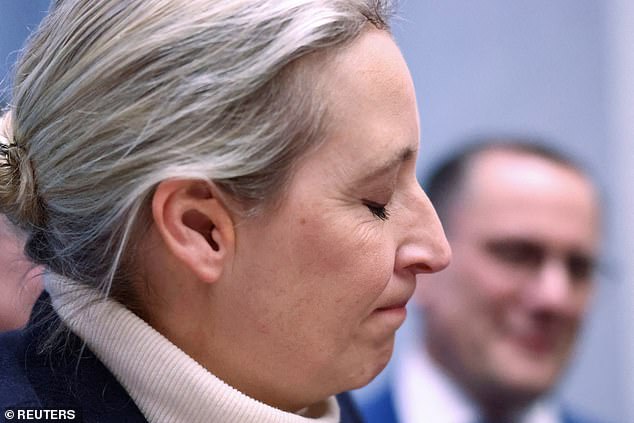Far-right German political party Alternative for Germady (AfD) has been classified as an extremist entity that threatens democracy by Berlin‘s domestic intelligence agency.
The Federal Office for the Protection of the Constitution (BfV) said the entity, which came second in February’s federal election, was a ‘proven right-wing extremist organisation’.
While some parts of the AfD – such as its youth wing and some state-level branches – have already been classified as extremist, this is the first time that the party, which has national representation in parliament, has been formally designated.
The new classification doesn’t ban the party, but it allows German authorities to intensify surveillance, including the use of undercover informants and monitoring communications.
A 1,000-page internal report from the BfV accuses the AfD of violating core constitutional principles such as human dignity and the rule of law.
‘The ethnicity- and ancestry-based conception of the people that predominates within the party is not compatible with the free democratic order,’ the agency said.
‘It aims to exclude certain population groups from equal participation in society, to subject them to treatment that violates the constitution, and thereby assign them a legally subordinate status.’

Alice Weidel, Alternative for Germany (AfD) party co-leader, reacts on the day of a party parliamentary fraction meeting following the German Federal Elections in February

The new classification doesn’t ban the party, but it allows German authorities to intensify surveillance, including the use of undercover informants and monitoring communications

The party won a record number of seats in February, which theoretically entitles it to chair several key parliamentary committees
Interior Minister Nancy Faeser said: ‘The AfD represents an ethnic concept that discriminates against entire population groups and treats citizens with a history of migration as second-class Germans.
‘Their ethnic attitude is reflected in racist statements, especially against immigrants and Muslims.’
She denied claims there was any ‘political influence whatsoever in the BfV’s findings.
The AfD is likely to challenge the assessment in court.
Deputy chairman Stephan Brandner said today that the ruling was ‘complete nonsense, has absolutely nothing to do with law and order, and is purely political in the fight of the cartel parties against the AfD.
The organisation was initially classified as a case under investigation by the Federal Office in 2019, before the probe was upgraded to a suspect extremist case two years later.
The decision comes days before conservative leader Friedrich Merz is due to be sworn in as Germany’s new chancellor and amid a heated debate over how to deal with the AfD in the new parliament.
The Bundestag, will hold a vote next week to confirm Merz, who plans to head up a coalition with the centre-left Social Democrats.
The party won a record number of seats which theoretically entitles it to chair several key parliamentary committees although it would still need the backing of other parties.
The populist party earned 20.8 per cent of votes in February’s election, finishing second behind Merz’s CDU/CSU bloc who had 28.6 per cent of the vote.

The populist party earned 20.8 per cent of votes in February’s election, finishing second behind Merz’s CDU/CSU bloc who had 28.6 per cent of the vote

Co-leaders of the far-right Alternative for Germany (AfD) party Alice Weidel and Tino Chrupalla
But recent polls have put the AfD ahead of the coalition, reflecting their increased popularity.
Elon Musk endorsed the party ahead of the election this year, saying it was the only one that ‘can save Germany.’
This ruling adds fuel to the ongoing debate over whether the party should be banned, however.
Any of Germany’s four constitutional bodies – the Bundestag, Bundesrat, federal government or Federal constitutional court – can initiate the AfD’s exclusion.
Outgoing Chancellor Olf Scholz said any debates around banning AfD ‘must not be rushed’.
In a speech in Hanover today, he added: ‘These things need to be weighed very carefully, I’m against taking a quick shot.’
This article was originally published by a www.dailymail.co.uk . Read the Original article here. .

